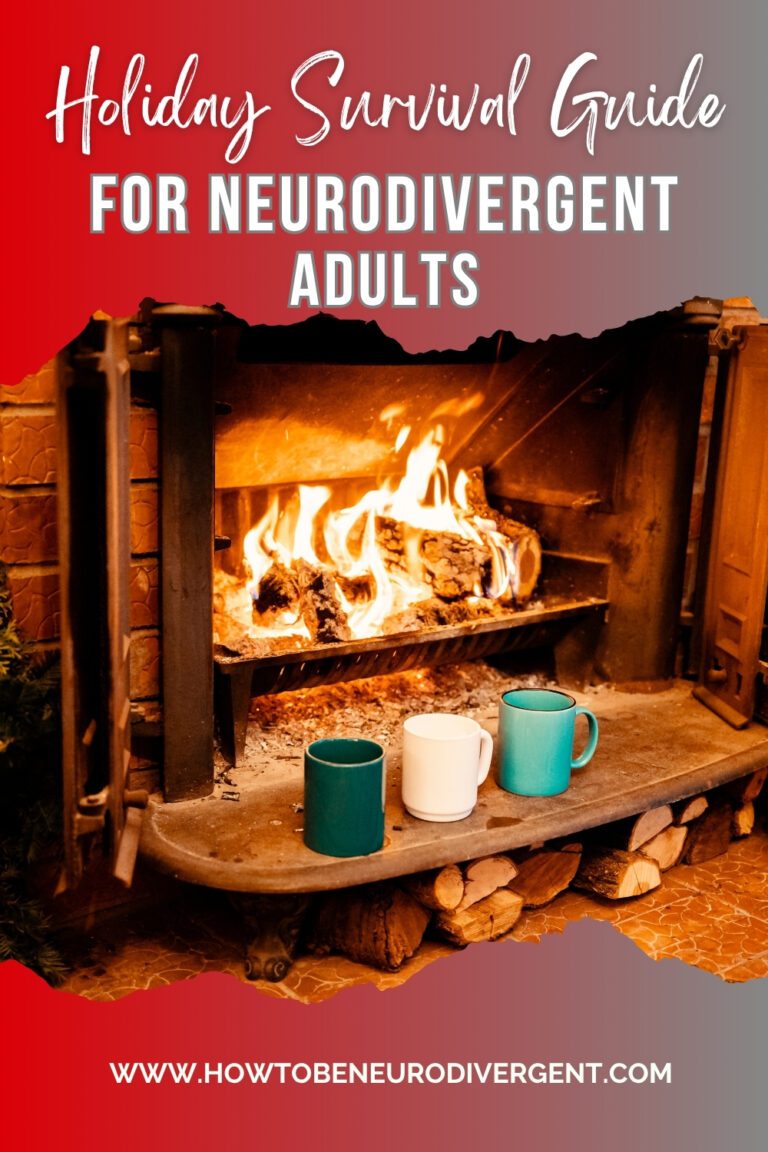Table of Contents
ToggleExcited and Exhausted?
The holidays can be a strange mix of excitement and exhaustion. There’s comfort in familiar traditions and stress in the noise, expectations, and constant togetherness. Surviving the holidays as a ND adult can feel like juggling too much of everything all at once.
You can love your people and dread the gathering. You can want connection and need recovery time. Both can be true.
This guide offers sensory, social, and emotional strategies to help you make it through the season with a little more ease. And you might even truly enjoy it without guilt and excessive overwhelm.
1. Sensory Survival: Protecting Your Senses During the Season
Holiday environments tend to be sensory overload central: flashing lights, overlapping conversations, unfamiliar foods, scratchy clothing, and constant background noise. Not to mention the shift to cooler temperatures and crowded shopping experiences. Even when it’s “fun,” your nervous system might disagree.
Try building small supports that keep you regulated:
Bring sensory tools–earplugs, sunglasses, fidgets, or a weighted lap pad can make a big difference. From the outside, it may look like you’re less present. But staying regulated can help you feel comfortable and more able to enjoy the moment you’re in.
Plan sensory breaks–step outside, go to a quiet room, or sit in your car for a few minutes. When I was a mother to infants, it was easy to ask for a private, quiet place to retreat to. Expected almost. It was no problem to ask for it on behalf of someone else. As a late-diagnosed adult, it can be difficult to advocate for your own needs. But it’s just as important.
Create calm zones at home–soft lighting, cozy textures, and gentle background sounds can help you decompress. It’s important to provide yourself places of retreat where you can control the sensory input. Especially during the busy holiday season.
Give yourself permission to say no–You don’t have to attend every event or participate in every activity. The Turkey Dinner with your co-workers, The Festival of Trees community fundraiser, The Santa Light Parade, The traditional white elephant gift exchange at Aunt Margaret’s…Take your own health and well-being into account. Choose the events that are most important to you and your loved ones. Skip out on the rest.
A note for ADHDers: Dopamine and Holiday Overload
If you lean toward the ADHD side of things, you might actually crave all the lights, activity, and excitement. The novelty and stimulation can feel amazing…until it doesn’t. It’s easy to get swept up in doing all the things because it feels good in the moment.
- Try to check in with yourself and notice when your energy or focus starts to dip.
- Reserve some motivation for the day-to-day things that keep you grounded (meals, rest, recovery.)
- Balance sensory seeking with sensory care. Even if you enjoy stimulation, your nervous system still needs downtime to recalibrate. I know, I know. Balance is an ever elusive phenomenon. But having awareness of this fact is half the battle.
- Build pauses into the fun. Slow moments help the joy last longer. Embrace your natural energy ebbs and flows.
Five-Minute Sensory Reset Ideas: Close your eyes and take deep breaths, rinse your hands in cool water, stretch your shoulders, or listen to a single song on headphones.
2. Social Navigation: Managing People, Energy, and Expectations
Social interactions during the holidays can be draining. Especially when masking, decoding group dynamics, or navigating family expectations.
Before the event, decide what your boundaries and energy limits look like. For example:
“I can stay for an hour.”
“I’ll come for dinner but skip the game night.”
You can also plan:
- Exit strategies. Drive yourself, or set a code phrase with someone you trust.
- Conversation scripts. Simple responses for small talk (“It’s been a busy season, but I’m taking things slow this year.”)
- Social breaks. It’s ok to disappear to a quiet space or take a walk mid-event
Not every tradition or invitation needs to be accepted. It’s ok to choose what truly matters to you and let the rest go. I know it can be tempting to get down on yourself or worry about disappointing friends and family with your limited social energy. But if there’s one thing I’ve learned as a high-masking neurodivergent adult, trying to please everyone will ultimately lead to burnout.
People may be disappointed. If they have never experienced the very real consequences of neurodivergent burnout, they might struggle to understand. But it’s ok. Doing your best means doing what you can while still preserving your health and well-being. And everyone deserves that.
3. Emotional Regulation: Managing Holiday Stress, Guilt, and Burnout
Even when things look calm on the outside, the emotional load of the season can build up fast. Shifts in routine, intense sensory input, and family dynamics can all take a toll.
And don’t even get me started on the gift exchanging. What type of gift is appropriate in what situation? Am I spending too much? Too little? How do I express the appropriate amount of gratitude with my face when it’s my turn to open a gift? And did they really mean it when they said they’d rather not exchange gifts? Or were you supposed to know they expected a thoughtful surprise?
You’re not overreacting. You’re responding to a real level of demand on your system.
Try:
- Scheduling downtime before and after social events. Your nervous system will thank you for recharging and regulating before and after.
- Practicing grounding. Notice what you can see, hear, and feel in the moment. But if focus on external sensory input causes overwhelm, take time away in a quiet space instead.
- Letting go of “shoulds.” There’s no rule that says you have to feel festive every day. And no one can please everyone. No matter how much we might like to.
- Watching for burnout signs. Exhaustion and irritability, or brain fog mean it’s time to rest.
Recovery day tip: Build them into your plans before the holidays start. Rest doesn’t have to be earned. It’s part of staying well.
4. Redefining What the Holidays Can Look Like
You’re allowed to celebrate in ways that fit you. That might mean smaller gatherings, quiet mornings, or your own sensory-friendly traditions. It might mean following your own energy patterns and embracing bursts of activity and socializing when the mood strikes and leaving your schedule open for rest in between.
Ideas for alternative traditions:
- Movie marathons instead of parties. Our family enjoys watching The Muppet Christmas Carol and stringing popcorn and Froot Loops for the tree.
- Cozy meals at home. It’s ok to order in instead of making everything from scratch. Even if the food isn’t traditional holiday fare. (Thank you sensory sensitivities and food aversions…).
- Virtual check-ins instead of long trips. Advances in communication technology exist for a reason. Traveling as a neurodivergent family can be particularly difficult.
- Gentle decorating with soft lights and natural textures. We love turning on our favorite Christmas music and cutting a gazillion paper snowflakes to hang up around our living room.
Redefining the holidays isn’t “missing out.” It’s creating a version that actually feels safe, comfortable, and meaningful.
Closing Thoughts
Surviving the holidays as a ND adult doesn’t mean doing it all. It means doing what helps you feel grounded and authentic.
You don’t have to meet every expectation or attend every event. You can rest, say no, and protect your peace. You can have a season filled with warmth and connection on your own terms.
You don’t need to earn rest or joy this season. They’re already yours.
If you enjoyed this article, you might like this one 👉Sensory Sensitivities: Practical Solutions for a Sensory-Friendly Life.
Thanks for listening, friends.
Disclaimer:
This post reflects my personal experiences and perspectives as a late-identified neurodivergent adult. While I aim to share helpful insights, I don’t speak on behalf of the entire ADHD or autistic community. Neurodivergence is diverse and individual—please interpret this content through the lens of your own needs and experiences. This article is not a substitute for professional or medical advice.






